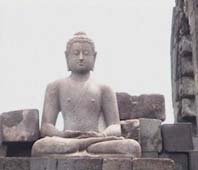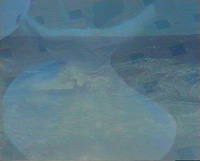|
Home
Previous
Next
Study
text
 |
|
Basic description: Employment of ascetic and
meditative disciplines in a deliberate quest to interrupt, slow down, or
otherwise break through and become free of, the obscure limitations of
distracting compulsions of ordinary life in order to attain a direct
awareness of ultimate reality, come to be wholly at-one with it, and have
a life and one’s relations with all things become transparently grounded
in it.
|

Characteristic virtues
Characteristic vices
or excellences of
practice or degenerations of practice
|
1. Competence:
Inwardly self-mastered, at-one with oneself; profoundly acquainted
with the deeper truths of which one’s tradition testifies on the basis
of personal contemplative experience; master of the path that leads to
their personal realization; skillful in the practice of its ascetics
and meditative disciplines; master in guiding others along the path.
2. Balance of
finitude and infinitude:
Passionately in
pursuit of enlightenment ( a direct seeing into, and union with,
ultimate reality that will enable all things to be seen for what they
really are and related to their integrity) by way of practices that
anticipate it; diligent in the practice of the relevant disciplines
but never confusing the means with the goal; possessed of quiet
centeredness and inner simplicity coupled with practical realism;
attentive to what is going on both within and without; dispassionate
and detached (i.e., free from this worldly passions and attachments)
while still appreciating finite goods in their place; living a life
centered upon what is essential, with all else held lightly.
3.
Selflessness: Free of self-preoccupation, pretentiousness, and the
distortions of consciousness that arise from the unenlightened self;
committed to ongoing spiritual transformation and willing to take on
spiritual discipline for its sake when appropriate (i.e., freedom from
the presumption to “having arrived”), boundless and compassionate in
hospitality of spirit; affirming each person’s need to find and follow
his own path at his own pace. |
1. Shadow side
of competence: ready to treat all problems as solvable through
mystical spiritual disciplines; quietistic; apathetic towards what
lies beyond or outside the mystical quest.
2.
Incompetence: Not inwardly in touch with oneself; inexperienced;
reckless and naively venturesome in tackling ascetic disciplines and
meditative practices that are inappropriate for one’s present state of
development; offering spiritual advice at second or third hand;
lacking in empathy towards others’ spiritual growth and ignorant of
what is appropriate for them.
3. Imbalance:
Loss of finitude: Wholly other worldly in outlook; disposed to
extreme self-mortification; disdainful of mundane concerns and the
welfare of others; tending to confuse the means, or a certain stage of
development, with the goal; over-serious (possessing no sense of
humor); impatient with things beyond one’s control.
4. Imbalance:
Loss of infinitude: Characterized by spiritual adventurism and
mystical dilettantism- seeking “ Mystical Experiences” – with little
if any commitment to personal transformation or sincere pursuit of
at-one-ment with ultimate reality; preoccupied with correct method
(the outer forms) of mystical quest at the expense of its substance;
characterized by acedia (spiritual boredom, loss of passion for what
is higher).
5. Egoism:
Spiritual elitist (disdain for persons who lack spiritual
enlightenment); escapist (pursuit of mystical quest as a way of escape
from outward problems); exploitation of mystical experiences, lore, or
status in service of egoistic motives or material advantage. |
Inscription on the tombstone of Mevlana Jellalludin Rumi:
Come, come, whoever you are ,
wanderer, worshipper,
lover of leaving,
it doesn’t matter.
Ours is not a caravan of despair.
Come even if you have broken your
vow a thousand times,
Come, yet again, come, come…….
The Way of Reasoned Inquiry Next
|



